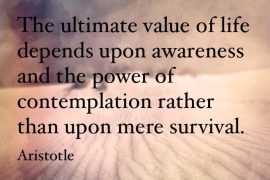
Dr. Robert Cialdini, a well-renowned psychologist and author of the bestseller book “Influence” says: “One of the first things that we learn as citizens … is the principle of Reciprocation; the one that says ‘I am obligated to give back to you the form of behavior that you first give to me.’”
What Cialdini is highlighting here is the importance of appreciation, gratitude, and giving back in return of a favor or a gift; all of which could be simply translated as our obligation of saying “Thank You.”
Appreciation is a vital element to the society’s progress and it is an act that is widely spread but, unfortunately, is coming to a decrease. The word “Thank You” has become too heavy on the tongue and the recipient of a favor or a gift has grown too proud to be grateful.
The giving I’m talking about could be as simple as getting someone a glass of water to dedicating our time, talent, or money to a person, a group of people, or an organization. I believe you would agree with me that those actions require thanks from the recipient’s side but what you and I could have missed is the fact that it requires the purity of our intention as much as it does the purity of the action.
Having said that, I do not wish to focus on the recipient’s obligation to thank, but on the giver’s intention to give because we have no control over the person we give, but we have total control over ourselves, our attitudes, and reactions towards the recipient’s manners or lack thereof.
Some might argue that we could easily ask the recipient to appreciate us by letting them know how much we are in need of their pat on the back or could give them a lesson in politeness by telling them that a “Thank You” is a must. However, the consequences of those reactions would have the following results: Namely, the recipient could neglect our need, doubt the purity of our action, or give us a thank you, a non-genuine one. Although there is a possibility that we’ll get what we need, it is obvious that none of those possibilities are self-empowering.
I believe you remember some of the events taken place in Ramadan; the inspirational efforts of our youth in giving their time and resources to some members of the community.
I do not believe those volunteers would mind or be soar if no one patted them on the back and thanked them. Go ask them, and they would agree with me because, you see, their intention was so pure and the result that came out of their action was too abundant to be topped by a compliment.
Giving is good for your soul and health. It gives you a feeling of majesty and comfort; a luxury that is only enjoyed by kings. Expecting something in return, waiting for a reward, or seeking a favor out of it only contaminates the purity of the act.
Yes, it is true that we need to be appreciated at work for a job well done to keep us going and give us confidence, but there will be times when we would not get it. And it is at those times when we need to be empowered. So, let us have an intention that does not include receiving appreciation, because the true long-lasting empowerment comes out from within while a trembling short-term one is established through someone or something outside our system.
There are many things in this world that you need to seek and run after but appreciation is not one of them. If we would go back to Cialdini’s quote we can now understand a deeper meaning; “appreciation will come to you in its own form”, so never disempower yourself by demanding it. And as a local saying goes: “Do good, and throw it in the sea (forget about it)”.




MashAllah good article Alanoud
Most Muslims, people of faith and indeed some people of no faith would require no appreciation for the good act, service or charity towards another. Their appreciation lies with God alone or from the feel good factor they receive having helped someone. As you correctly mentioned purity of intention is crucial.
By the way love the illustration by Fatma!
Lovely post, as usual not to be surprised since [You] wrote it.
I have few comments, the first is that many people today they give not because they want to receive a thank you or appreciation, many people I know they give so they receive a gifts in return. As you see today the trend in UAE specially among ladies, if someone gave you a gift if you don't give a better gift back you are considered "Cheap" it's good to give back gifts but what's not good to feel that you must give back otherwise they will think badly of you.
Another comment, if when you are giving something and waiting for something in return in fact you are not giving, you are seeking. Like when we pay money to eat food, we give money to get food and if we know we wouldn't get food most likely we wouldn't pay. Similarly before giving, ask yourself this question? What is your intent in giving, wait for 30 seconds at least and be sure of your intents.
I have many other comments on this topics but I don't want to ruin the beautiful post you posted by a long comment. All the best 3noud